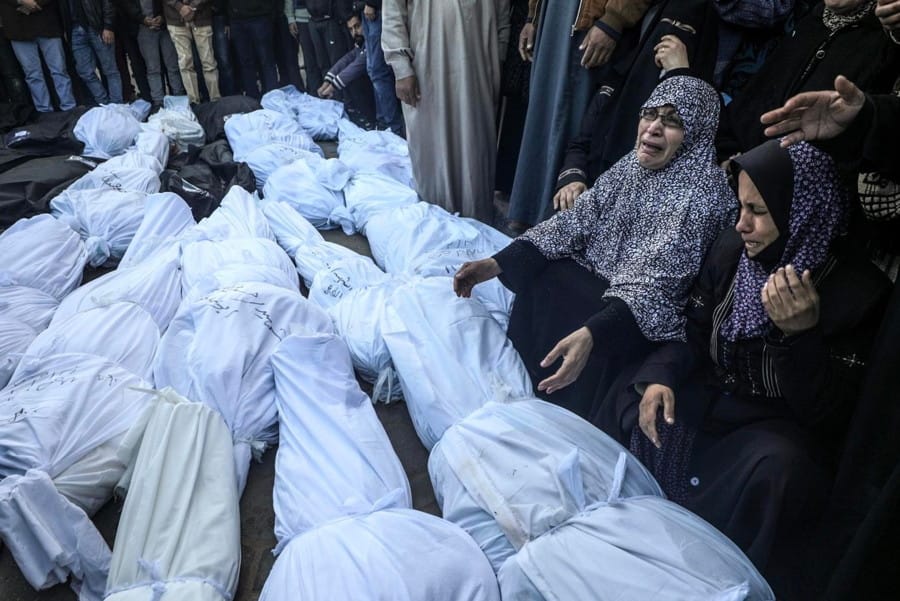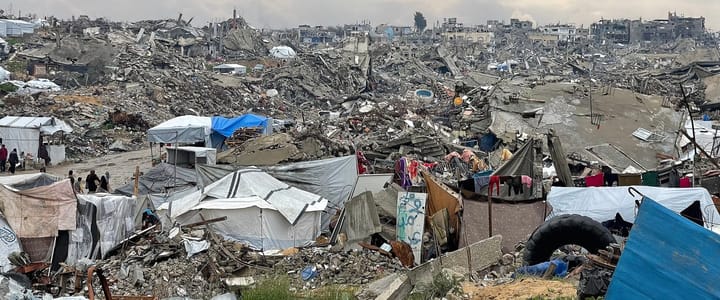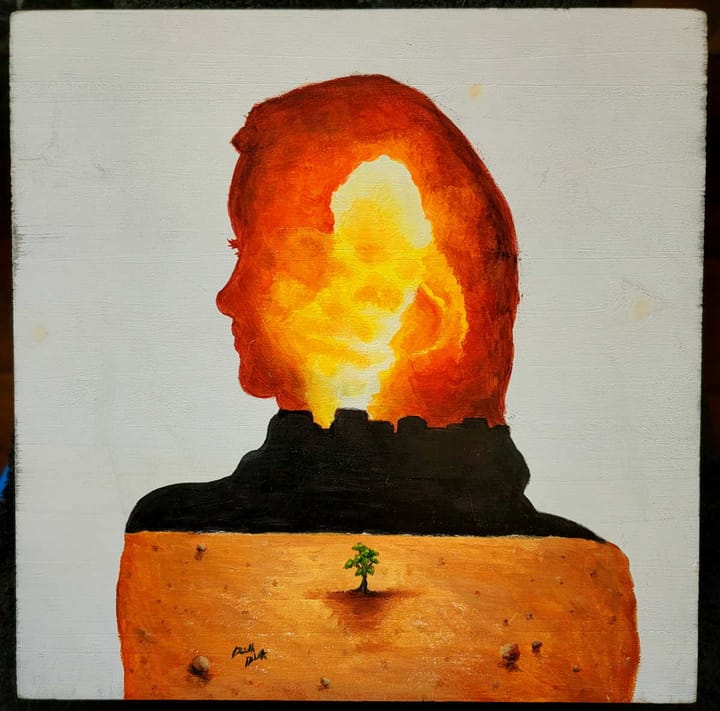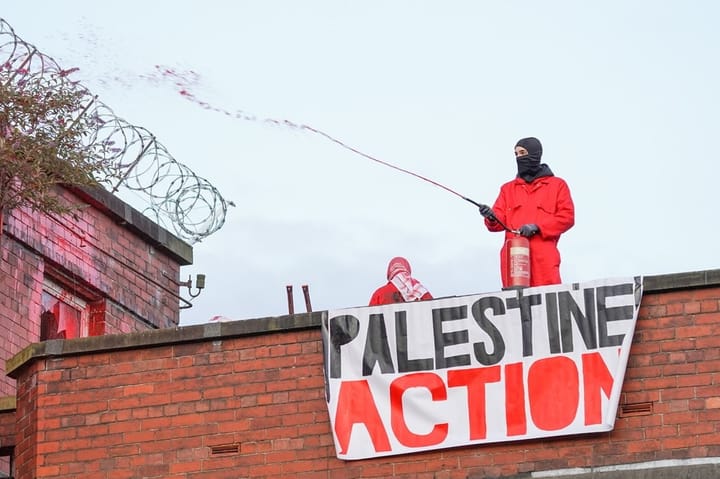Genocide for Skeptics

by Flavio Del Santo.
Israel has been bombing Gaza for over 13 months: the humanitarian crisis across Palestine, as well as in neighboring areas of the Middle East, has reached unprecedented critical levels. The UN estimates that more than 43,000 Palestinians have been killed, including around 17,000 children, with over 102,000 injured, while 1.9 million have been displaced out of a total population of 2.2 million in the Gaza Strip! [1].
Although there is a positive trend in public opinion and participation in initiatives increasingly condemning these atrocities—such as the student movements from last spring, which saw the largest global wave of university occupations since the Vietnam War—there remains a strong repressive reaction towards criticism of Israel, which is censored or, more often, grotesquely labeled as ‘antisemitism’, or violently suppressed [2]. Because of this intense polarization in the normally available information, it often feels like there is a reticence, a skepticism towards the differing narratives, seen as biased and instrumental, especially those in favor of Gaza, which have always been the domain of our leftist, anti-imperialist, and anti-system environments. I believe that many of our narratives, put forth in the interest of truth and peace, are often labeled as ideological, biased, perhaps hyperbolic, and therefore largely ignored or openly opposed. This article is an attempt to tell a story to those skeptics, the confused, or those who deliberately cling to 'neutral' positions. So, it is a piece specifically written for moderates, like those who, for the reasons mentioned above, become rigid when they hear the word 'genocide'.
In fact, a great deal is at stake even from a purely pragmatic perspective. On one hand, failing to acknowledge—and even materially supporting—a (plausible) crime of genocide would set a precedent so grave that it would undermine the entire value-based democratic narrative. On the other hand, Israel’s aggression represents a ticking time bomb that could lead to long-lasting instability in the global political and economic system. For these reasons alone, everyone should feel compelled to move beyond the illusion of “neutrality,” form an opinion based on the facts, and act accordingly.
Although it is generally impossible to provide completely objective data free of interpretation, and I say this as a scientist, at some point it will be inevitable to recognize the competence and authority of certain sources, as well as the relevance of some analyses. In the context of this article, I propose that such authority be recognized in the United Nations, which, representing all states, is the entity that most closely approximates a non-partisan organization. I will therefore try to summarize the latest developments of the Israeli invasion of Gaza and its occupation of the West Bank and East Jerusalem through the official sources of the UN.
The news of the presentation of a formal genocide charge against Israel at the International Court of Justice (ICJ) on 23 December 2023, last year, had caused a great stir and was often met with suspicion of alleged bias and exaggeration. A few weeks ago, it was officially announced that 14 other countries, including NATO members Belgium, Spain, and Turkey, would join South Africa, which had initially filed the case [3]. The ICJ, which is still deliberating on the case, has already considered "plausible that Israel's actions could amount to genocide" [4]. Meanwhile, on 21 November 2024, the International Criminal Court issued arrest warrants for a Hamas leader and Israeli Prime Minister Benjamin Netanyahu and former Defense Minister Yoav Gallant, accused of "war crimes and crimes against humanity committed in the territory of the State of Palestine (in the Gaza Strip)" [5] , [30].
On 19 July 2024, the International Court of Justice issued a ruling, which, among other things, stated that "the continued presence of the State of Israel in the Occupied Palestinian Territories [since 1967] is illegal [...] and that all States are under an obligation not to recognize as legal the situation arising from the unlawful presence of the State of Israel in the Occupied Palestinian Territory and not to render aid or assistance in maintaining the situation created by the continued presence of the State of Israel in the Occupied Palestinian Territory" [6]. The ruling also included an explicit statement by the president of the ICJ, Nawaf Salam, who highlights that "the declaration also examines Israel’s discriminatory laws and measures in the Occupied Palestinian Territory, demonstrating that they are tantamount to the crime of apartheid" [6].
A few days later, 30 July, a team of 37 experts, Special Rapporteurs, and members of the UN Human Rights Council Working Groups called the ruling "historic," urging all countries to impose "arms embargo, an end to all other commercial activities that may damage the Palestinians, and targeted sanctions, including asset freezes, on Israeli individuals and entities involved in illegal occupation and racial segregation and apartheid policies" [7]. Yet, Israel continues to receive arms and goods from Western countries that claim to defend liberal and democratic values on the international stage. Since the beginning of the invasion of Gaza on 7 October 2023, the US alone has provided between $12.5 billion and $17.9 billion in military aid to Israel [8] (representing 65.6% of Israel's arms imports, while 29.7% comes from Germany and 4.7% from Italy [9]).
In June, the UN Office for the Coordination of Humanitarian Affairs denounced Israel for carrying out "systematic attacks on hospitals and other health facilities in violation of the laws of war," killed 500 healthcare workers in Gaza, and arbitrarily detained or disappeared an unspecified number of medical workers [10]. This led to the collapse of the healthcare system, resulting in the spread of infectious diseases with particularly devastating consequences for the elderly, children, and pregnant women [11].
In the past two months, Israel's aggression in Gaza and the surrounding areas has increased. Concurrently, Israel has launched a systematic campaign against the United Nations, which continues to produce reports on a situation that grows more critical each day. To begin with, in October, Israel banned UN Secretary-General Antonio Guterres from entering its territory [12]. Additionally, it is bombing and invading Lebanon, after carrying out a mass explosive attack on the civilian population, which the UN described as a "terrifying violation of international law" [13]. A few days later, the Israeli military deliberately opened fire, without penalty, on UN peacekeepers from the United Nations Interim Force in Lebanon (UNIFIL) [14].
Furthermore, at the end of October, the Israeli Knesset passed a law banning the United Nations Relief and Works Agency for Palestine Refugees in the Near East (UNRWA) within 90 days. This will prevent the main source of humanitarian aid to Palestine from operating in the territories controlled by Israel, including those illegally occupied and the Gaza Strip [15]. Following this, Israel officially ended its cooperation agreement with the UNRWA at the UN [16]. Israel has also repeatedly attacked UN humanitarian infrastructures, causing deaths and injuries to humanitarian workers [17]. Meanwhile, Norway has initiated proceedings at the ICJ seeking a ruling to require Israel to facilitate humanitarian aid to Palestine through all associations, including UNRWA [18].
Between September 2024 and today, several UN agencies have submitted significant analyses on the devastating situation in Palestine. In the interest of space, I will only cite a few examples, offering brief excerpts from each. However, all converge on painting a portrait of the inhumane reality faced by the Palestinian population.
A report from the UN Special Committee to Investigate Israeli Practices Affecting Human Rights in Palestine and Other Arabs in the Occupied Territories presented to the UN General Assembly in September raised "serious concerns of breaches of international humanitarian and human rights laws in the Occupied Palestinian Territory, including starvation as a weapon of war, the possibility of genocide in Gaza and an apartheid system in the West Bank, including East Jerusalem". Moreover, of great interest for scientists who need to be aware of the technology they develop, the report goes on raising “serious concerns about the use by Israel of artificial intelligence in directing its military campaign. Credible media reports indicate that the Israeli military lowered the criteria for selecting targets while increasing their previously accepted ratio of civilian to combatant casualties. These directives reportedly enabled the military to use artificial intelligence systems [...], to rapidly generate tens of thousands of targets, as well as to track targets to their homes, particularly at night when families shelter together”. The report concludes that "Israel's policies and practices during the period covered by the report are consistent with the characteristics of genocide" [19].
On 1 October 2024 the UN Special Rapporteur on the situation of human rights in the Palestinian Territories occupied since 1967, Francesca Albanese, presented a report to the General Assembly titled "Genocide as Colonial Erasure," concluding: "Statements and actions by Israeli leaders reflect a genocidal intent and conduct. [...] This ongoing genocide is doubtlessly the consequence of the exceptional status and protracted impunity that has been afforded to Israel. [...] As the world watches the first live-streamed settler-colonial genocide, only justice can heal the wounds that political expedience has allowed to fester. The devastation of so many lives is an outrage to humanity and all that international law stands for" [20].
On 2 November 2024, a team of 8 UN experts stated in a report to the United Nations in Geneva: "We remain convinced that the Palestinian people are at grave risk of genocide [...]. The time for action is now. Israel’s allies also bear responsibility and must act now to prevent its disastrous course of action" [21].
On 8 November 2024, the UN High Commissioner for Human Rights presented a report to the UN Human Rights Council, stating that "the violations documented in this report by the parties could amount to war crimes. If committed as part of a widespread or systematic attack directed against a civilian population, further to a State or organizational policy, they may constitute crimes against humanity. If committed with intent to destroy, in whole or in part, a national, ethnical, racial or religious group, they may also constitute genocide" [22].
Finally, on 19 November 2024, the Chairman of the UN Committee for Investigating Israeli Practices Affecting Human Rights in Palestine, Mohan Pieris, presented a report to the General Assembly in which, unequivocally, he stated: "Our report leaves no room for ambiguity. A genocide is unfolding before our eyes. Failing to act now—failing to put an end to this atrocity crime— will tear apart the very foundation of the international rule of law we have collectively built to protect peace, security, and the well-being of all. Our inaction today is setting a perilous precedent for tomorrow. Think about it." [23].
In light of this remarkable body of testimonies and statements from international experts within the framework of investigations conducted by the relevant UN bodies, even for skeptics, moderates, and those trying to avoid taking partisan positions, there is little room to doubt that war crimes, crimes against humanity, apartheid, ethnic cleansing, and genocide are being perpetrated in Palestine.
In fact, while I understand the historical and legal importance of the issue, I find it rather petty to focus the debate on the connotation of the word “genocide” and whether it applies to the massacre Israel is committing against the civilian population of Gaza, all from the comfort of our living rooms in the West. Stopping this massacre, whatever name we assign to it, is what we should urgently focus on.
Yet, fresh news from the 20 November UN Security Council session reveals that, despite unanimous support from the other participants, the United States used its veto power to block “an immediate and unconditional ceasefire in the Gaza Strip” [24]. This marks the 49th time the U.S. has exercised its veto to block Security Council resolutions against Israel, the fourth time this year alone, preventing a call for a ceasefire [25].
As I wrote with indignation, a sentiment that has only grown stronger since that time, on 22 October 2023—just two weeks after the brutal Hamas attack that served as the casus belli for Israel’s violent offensive in Gaza—the United States and many echoing Western countries are simply “inhumanitarian” [26]. This resonates with the courageous words of Francesca Albanese, who, addressing the UN General Assembly on 30 October, declared: “Those among you who have not uttered a word about what is happening in Gaza demonstrate that empathy has evaporated from this room. And empathy is the glue that makes us stay united as humanity” [27].
From our privileged position in the West, we perhaps fail to grasp the dire situation the world faces around us: two billion people—a quarter of the global population—now live in regions affected by violent conflict, the highest figure since World War II [28]. Meanwhile, global military expenditure has been setting new all-time records every year since 2009, reaching $2.44 trillion in 2023 [29].
Will we finally be able to rediscover empathy, striving toward peace instead of relentlessly pursuing self-destruction? Will we be capable of reclaiming our humanity?
Flavio Del Santo is a researcher in theoretical physics at the University of Geneva and a founding member of IUS. He has been deeply involved in university political activities and broader political initiatives both in Italy and internationally, with a focus on antimilitarism, as well as in research on the history of science and its development within political and cultural contexts.
References
[1] https://www.ochaopt.org/]
[2] https://www.amnesty.org/en/documents/eur01/8199/2024/en/
[3] https://unric.org/en/south-africa-vs-israel-14-other-countries-intend-to-join-the-icj-case/
[4] https://www.ohchr.org/en/press-releases/2024/01/gaza-icj-ruling-offers-hope-protection-civilians-enduring-apocalyptic
[5] https://www.icc-cpi.int/news/statement-icc-prosecutor-karim-aa-khan-kc-applications-arrest-warrants-situation-state
[6] https://www.icj-cij.org/sites/default/files/case-related/186/186-20240719-sum-01-00-en.pdf
[7] https://www.ohchr.org/en/press-releases/2024/07/experts-hail-icj-declaration-illegality-israels-presence-occupied
[8] https://www.cfr.org/article/us-aid-israel-four-charts
[9] https://www.bbc.com/news/world-middle-east-68737412
[10] https://www.un.org/unispal/wp-content/uploads/2024/06/Statement-on-the-killing-and-arbitrary-detention-of-health-workers-in-Gaza-25-June.pdf
[11] https://www.un.org/unispal/wp-content/uploads/2024/06/Statement-on-the-killing-and-arbitrary-detention-of-health-workers-in-Gaza-25-June.pdf
[12] https://www.nytimes.com/2024/10/02/world/middleeast/israel-guterres-un-ban-persona-non-grata.html
[13] https://www.ohchr.org/en/press-releases/2024/09/exploding-pagers-and-radios-terrifying-violation-international-law-say-un
[14] https://news.un.org/en/story/2024/10/1155621
[15] https://www.theguardian.com/world/2024/oct/28/israeli-lawmakers-pass-bill-that-could-halt-unwra-relief-work-in-gaza
[16] https://www.theguardian.com/world/2024/nov/04/israel-formally-tells-un-of-intent-to-sever-all-ties-with-unrwa-relief-agency
[17] https://www.ohchr.org/sites/default/files/documents/countries/opt/20241106-Gaza-Update-Report-OPT.pdf
[18] https://www.theguardian.com/world/2024/nov/19/norway-to-ask-icj-for-advisory-opinion-condemning-israels-stance-on-unrwa
[19] https://www.ohchr.org/en/documents/thematic-reports/a79363-report-special-committee-investigate-israeli-practices-affecting
[20] https://www.ohchr.org/en/documents/country-reports/a79384-report-special-rapporteur-situation-human-rights-palestinian
[21] https://www.ohchr.org/en/press-releases/2023/11/gaza-running-out-time-un-experts-warn-demanding-ceasefire-prevent-genocide
[22] https://www.ohchr.org/sites/default/files/documents/countries/opt/20241106-Gaza-Update-Report-OPT.pdf
[23] https://www.un.org/unispal/document/un-special-committee-press-release-19nov24/
[24] https://news.un.org/en/story/2024/11/1157216
[25] https://www.middleeasteye.net/news/49-times-us-has-used-veto-power-against-un-resolutions-israel
[26] https://www.pressenza.com/2023/10/crisis-in-gaza-us-and-other-western-countries-are-inhumanitarian/
[27] https://www.youtube.com/watch?v=Bx7z3sG7A9o
[28] https://press.un.org/en/2023/sc15184.doc.htm
[29] https://www.sipri.org/media/press-release/2024/global-military-spending-surges-amid-war-rising-tensions-and-insecurity
[30] https://www.icc-cpi.int/news/situation-state-palestine-icc-pre-trial-chamber-i-rejects-state-israels-challenges




Comments ()